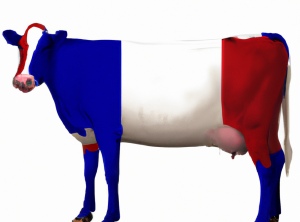Difference between revisions of "Language/French/Vocabulary/Vachement"
< Language | French | Vocabulary
Jump to navigation
Jump to search
m (Quick edit) |
m (Quick edit) |
||
| (One intermediate revision by the same user not shown) | |||
| Line 9: | Line 9: | ||
It's important to note that "vachement" is a colloquial expression and should be used in informal situations only. In more formal settings, it's best to use other expressions to indicate a high degree, such as "très," "extrêmement," or "incroyablement." | It's important to note that "vachement" is a colloquial expression and should be used in informal situations only. In more formal settings, it's best to use other expressions to indicate a high degree, such as "très," "extrêmement," or "incroyablement." | ||
<span link>Finish this lesson and explore these related pages: [[Language/French/Vocabulary/Asking-Directions|Asking Directions]] & [[Language/French/Vocabulary/Jobs|Jobs]].</span> | |||
* [[Language/French/Vocabulary/ | ==Other Lessons== | ||
* [[Language/French/Vocabulary/ | * [[Language/French/Vocabulary/When-use-Air-and-Aire|When use Air and Aire]] | ||
* [[Language/French/Vocabulary/ | * [[Language/French/Vocabulary/Environment|Environment]] | ||
* [[Language/French/Vocabulary/ | * [[Language/French/Vocabulary/How-to-say-Good-Bye?|How to say Good Bye?]] | ||
* [[Language/French/Vocabulary/Education|Education]] | |||
* [[Language/French/Vocabulary/Months-of-the-Year|Months of the Year]] | * [[Language/French/Vocabulary/Months-of-the-Year|Months of the Year]] | ||
* [[Language/French/Vocabulary/ | * [[Language/French/Vocabulary/Farm|Farm]] | ||
* [[Language/French/Vocabulary/ | * [[Language/French/Vocabulary/Common-abbreviations|Common abbreviations]] | ||
* [[Language/French/Vocabulary/ | * [[Language/French/Vocabulary/20-Vingts-or-Vingt|20 Vingts or Vingt]] | ||
* [[Language/French/Vocabulary/Family|Family]] | |||
* [[Language/French/Vocabulary/Difference-between-Autel-and-Hôtel|Difference between Autel and Hôtel]] | |||
* [[Language/French/Vocabulary/Bathroom|Bathroom]] | * [[Language/French/Vocabulary/Bathroom|Bathroom]] | ||
<span links></span> | |||
Latest revision as of 22:06, 27 March 2023
"Vachement" is a French colloquialism used to indicate a high degree of something, similar to the English word "really." It is commonly used in spoken French and is considered a casual expression. Here are some ways to use "vachement" in French:
- To emphasize an adjective: "Ce gâteau est vachement bon!" (This cake is really good!) "Ce film est vachement triste." (This movie is really sad.)
- To emphasize a verb: "Il travaille vachement dur." (He works really hard.) "Elle chante vachement bien." (She sings really well.)
- To indicate surprise or disbelief: "Vachement? Il a réussi l'examen?" (Really? He passed the exam?) "Il a gagné la compétition? Vachement fort!" (He won the competition? Really strong!)
It's important to note that "vachement" is a colloquial expression and should be used in informal situations only. In more formal settings, it's best to use other expressions to indicate a high degree, such as "très," "extrêmement," or "incroyablement."
Finish this lesson and explore these related pages: Asking Directions & Jobs.
Other Lessons[edit | edit source]
- When use Air and Aire
- Environment
- How to say Good Bye?
- Education
- Months of the Year
- Farm
- Common abbreviations
- 20 Vingts or Vingt
- Family
- Difference between Autel and Hôtel

